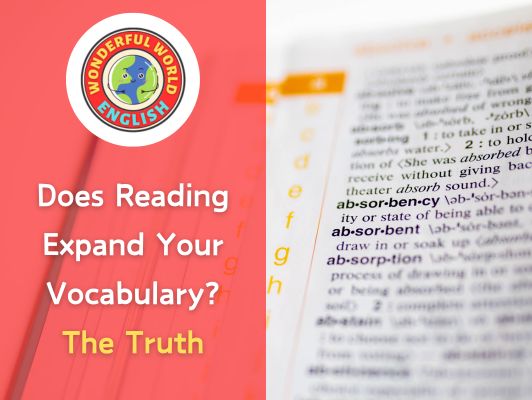Contents
Toggle
Meet David De’ Ath, founder, editor, and writer at Wonderful World English. With his extensive background as an English teacher, David provides valuable insights and practical tips on ESL for students and teachers alike.
Educators and linguists have studied extensively the relationship between reading and vocabulary.
There is a consensus that reading builds upon existing vocabulary and introduces new words that might not be encountered in everyday conversations.
Through consistent exposure to a variety of texts, individuals are likely to encounter a broader range of vocabulary, thereby expanding their lexicon.
This effect is not just limited to children and adolescents in educational settings; adults continue to acquire new vocabulary throughout their lives, indicating that the potential for vocabulary growth through reading persists beyond formal education.
Psychological studies and linguistic research indicate that reading can have a sizable impact on vocabulary expansion.
For example, in a study reflecting the effect of reading on vocabulary growth, researchers found a significant association between reading frequency and vocabulary size from a young age into adulthood.
This suggests that reading increases vocabulary depth, detailing word meanings and usage, and vocabulary breadth, encompassing a wide array of words from various fields and disciplines.
While more extensive and challenging texts tend to offer greater opportunities for vocabulary enhancement, even lighter materials contribute to vocabulary development by reinforcing previously learned words.
Key Takeaways
- Regular reading contributes significantly to the expansion of vocabulary.
- Vocabulary grows through exposure to diverse and challenging reading materials.
- Lifelong vocabulary enhancement is made possible by continued reading habits.
Vocabulary Enhancement Through Reading
Reading is a powerful tool for enhancing one’s vocabulary, allowing individuals to learn new words within context, across various genres, and in conjunction with developing comprehension skills.
Role of Context in Learning New Words
The context in which new vocabulary appears heavily influences the understanding and retention of new words.
When individuals encounter new words within a body of text, the surrounding words provide context clues that facilitate the deciphering of meanings.
Research reinforces the idea that learning vocabulary through context is natural and enduring, as it allows language learners to connect words with specific situations and uses, thus reinforcing their grasp of the language.
Influence of Different Genres on Vocabulary Growth
Different types of books expose readers to diverse language styles and vocabularies.
Fiction often introduces readers to rich narratives, themes, and figurative language, whereas non-fiction extends their knowledge by presenting facts, concepts, and technical terms.
Engaging with a variety of genres can lead to a more dynamic vocabulary development, as readers are likely to encounter both commonly used language and specialized jargon, making the learning experience both extensive and, often, fun.
Developing Comprehension Skills Alongside Vocabulary
As readers absorb new vocabulary, they simultaneously develop their comprehension skills.
This dual progress is essential, as comprehension and vocabulary are interdependent.
Enhanced vocabulary contributes to better comprehension, and vice versa—understanding complex sentences and themes allows for the integration of new words into one’s working lexicon.
Thus, by reading more and analyzing text, individuals expand their vocabulary and strengthen their ability to grasp and apply new concepts and ideas.
For a complete guide on the best books about vocabulary, check out the link below!
Related: Books About Vocabulary: Teacher’s Top Picks

Factors Contributing to Vocabulary Acquisition
Vocabulary acquisition is not solely dependent on exposure to words but is influenced by multiple interrelated factors.
This section explores the cognitive aspects that underlie vocabulary knowledge, the significance of repetition and memory, and the role of motivation and personal growth in the process of learning new words.
Cognitive Aspects of Vocabulary Knowledge
Cognitive elements play a crucial role in the development of vocabulary.
For children and high school students, the ability to understand and remember unfamiliar words is tied to several cognitive functions, such as focus, concentration, and comprehension.
A student’s background knowledge and thinking skills also contribute to their ability to integrate new vocabulary into their lexicon.
Enhanced critical thinking skills help in understanding synonyms and the contexts in which words can be used, broadening one’s active vocabulary.
The Role of Repetition and Memory
Repetition is essential for moving words from passive use to an active vocabulary, where they can be readily accessed and used.
Through repetition, words are encoded into memory, helping with long-term retention.
Teachers can facilitate this by incorporating a word list into lessons, encouraging regular use and engagement with new terms.
Independent reading also serves to reinforce this process as unfamiliar words are encountered and revisited within texts.
Importance of Motivation and Personal Growth
A learner’s motivation can greatly influence the expansion of their vocabulary.
A genuine love of reading, combined with a desire for personal growth and academic success, supports sustained independent reading habits.
This invariably leads to encounters with a wider range of vocabulary.
Additionally, reading for pleasure is linked with increased intelligence, as it fosters imagination and an innate curiosity about language.
Motivated individuals are more likely to dedicate time to expanding their lexicon and engaging with diverse materials that challenge their current vocabulary limits.
For some great ideas on fun vocabulary games and activities, the guide below has you covered!
Related: Fun Vocabulary Activities: 10 Ways to Boost Word Skills

Conclusion
In summary, reading plays a pivotal role in vocabulary expansion across all age groups.
By exposing individuals to diverse texts and contexts, reading enhances vocabulary depth and breadth, introducing words from various fields that might not be encountered in everyday interactions.
The integration of vocabulary through reading is supported by cognitive processes that deepen understanding and retention, making it a fundamental tool for lifelong learning.
Moreover, the motivation to read and grow personally further enriches this experience, making reading a powerful ally in the continuous journey of vocabulary enhancement and language mastery.
This multifaceted approach to learning through reading ensures that vocabulary development is both a rewarding and enriching process, capable of significantly broadening one’s linguistic horizons.
We hope you find value in this information; you can contact us if you require any support.
Have a wonderful day!
Image Attribution: All images licensed via canva.com





